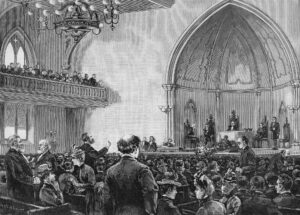Last year, the Alberta Court of Appeal released Wall v. Judicial Committee of the Highwood Congregation of Jehovah’s Witnesses,[1] a stunning judicial decision which, if upheld by the Supreme Court of Canada after it hears submissions in November 2017, has the potential to completely open up the floodgates for state imposition into church affairs.
The key issue for the Supreme Court to determine is as follows: how much authority do Canadian courts have on issues relating to church membership? If the answer is consistent with the Alberta Court of Appeal’s reasoning, then there is no question that religious freedom in Canada will suffer an extremely significant blow.
In order to understand the significance and implications of this case, let me begin with the facts.
The “Disfellowship” of Randy Wall
Randy Wall was a licensed real estate broker and a member of the Highwood Congregation of Jehovah’s Witnesses. He was deeply entrenched in the Jehovah’s Witnesses community, receiving about fifty percent of his business from members of that congregation.
One day, he received a letter from the Judicial Committee of the Highwood Congregation directing him to appear before a panel of three elders to answer allegations that he had engaged in drunkenness.
Mr. Wall complied with the letter and admitted to the elders that he was intoxicated on two occasions. Following his confession, the panel of elders determined that he was not “sufficiently repentant” and ruled that he must suffer “disfellowship”. This meant all Jehovah’s Witness were completely prohibited from having contact with him. No more “Hi, how are you?”, and definitely no more “Can you help me buy a house?”
Mr. Wall stood to lose everything with this decision, so he did what he could to change it. He appealed to another committee made up of elders from neighbouring Jehovah’s Witness congregations, but they agreed with the local Judicial Committee. Mr. Wall made one last appeal to the Watch Tower and Bible Tract Society of Canada, also to no avail.
Having exhausted all avenues of appeal, Mr. Wall’s disfellowship was final as far as the Jehovah’s Witnesses were concerned.
The Courts Intervene
From Mr. Wall’s perspective, however, the fight was just beginning. He decided to take matters into his own hands by bringing an application to the Court of Queen’s Bench, the highest trial court in Alberta. His purpose? To have the court overturn the Jehovah’s Witnesses’ decision to disfellowship him. Essentially, he decided to treat the court as a higher authority on the issue of his church membership than his local congregation, his region of churches, and his national denomination.
The Jehovah’s Witnesses responded with an eminently reasonable argument. In short, they submitted that the court had no jurisdiction to hear Mr. Wall’s application. The church’s ruling on Mr. Wall’s membership was an ecclesiastical decision, not a legal one. They argued that secular courts have no business intervening in religious matters, including who is considered to be part of the congregation and who is not.
Framed like this, it seems like a simple case to decide, doesn’t it? Of course a secular court doesn’t have authority to decide whether someone is or is not a part of a church. Courts have no authority to tell us who to worship, so why should courts have authority to tell us who we must worship with?
Shockingly, the courts disagreed.[2] Both the trial judge and the majority of the appellate court concluded that the Court of Queen’s Bench did have jurisdiction to hear Mr. Wall’s application, and it gave two reasons for this conclusion: (1) the process employed by the church in expelling Mr. Wall failed to conform to the principles of “natural justice”; and (2) the disfellowship had an “economic impact” on Mr. Wall.
What does all this mean? Let me start with the principles of “natural justice”. These are the rules that govern how decisions are made, as distinct from what decisions are made (think “Robert’s Rules of Order”). The principles of “natural justice” pertain to the most basic rules of procedure. They are the rules that keep the process fair, such as the right to be heard by an impartial tribunal, or the right to make submissions before that tribunal.
The power of Canadian courts to overturn the decision of a religious tribunal because of a violation of natural justice is not a new one. Indeed, it dates back at least 125 years.[3] Assessing the merits and implications of this long-standing legal principle goes beyond the purposes of this article. I note, however, that courts have made it abundantly clear that this principle gives them no power to consider the merits of the decision. It only gives them power to consider the process used to reach that decision. In other words, they can only consider whether the tribunal was fair, not whether the tribunal was right.[4]
The fact that the court in Wall relied on this principle is not what makes this case so significant. What is revolutionary about this case is that it extends the court’s jurisdiction far beyond the issue of process and into the issue of merit. How? By creating a whole new ground to review the Judicial Committee’s decision to expel Mr. Wall called “economic impact”.
Fifty percent of Mr. Wall’s clientele came from the Highwood Congregation, which meant that Mr. Wall lost half his client base once the Judicial Committee expelled him. For this reason, and this reason alone, both courts concluded that they had jurisdiction to review, and potentially overturn, the decision to discipline him out of the church.
How This Potentially Impacts Us
Can you imagine something similar happening in any evangelical church that faithfully practices church membership and discipline? I can. Yes, there are key differences between us and the Jehovah’s Witnesses. True, biblical, gospel-centered church discipline is redemptive, not punitive.[5] We do not shun disciplined members. Rather, we continue to pursue them with the same love and concern we would have for anyone who is lost and alienated from God.[6]
This is a crucial distinction between our understanding and practice of church discipline and the Jehovah’s Witnesses, but in the end, I’m afraid it won’t make much difference when it comes to potential judicial oversight. Even if someone were biblically disciplined, it wouldn’t be difficult for them to claim economic impact. “It ruined my reputation”, or “I had to move because of the shame I felt”, or “I was so hurt that I lost my job” could all open the door for a Canadian court to review not only the fairness of the process leading to the decision to discipline, but the merits of the decision itself. And just like that, secular courts would become the final arbiters of who was a member of the church and who was not.
There’s another implication of the Wall decision that is even more disturbing. If courts have jurisdiction to review church decisions that have an “economic impact” on individuals, then who’s to say that such review should only be limited to church discipline? After all, there are all sorts of church decisions that potentially have an “economic impact” on individual members. For instance, a church may decide to send out a number of families to plant a church in a nearby city, which could lead one member to lose clientele. If that member were opposed to the church plant, he could plead “economic impact” and have the courts review whether the church plant should go forward. If “economic impact” remains as a ground for reviewing church decisions, then the court’s authority over the church will be nearly limitless.
What can we do? We pray, and we prepare. We must pray that the nine judges of the Supreme Court of Canada see the danger of this reasoning and its devastating impact on religious freedom. But if, in the sovereignty of God, they do not, then we must prepare. We must prepare to continue to do what the Scriptures require us to do, regardless of the cost, for “We must obey God rather than men.”[7]
[1]https://www.canlii.org/en/ab/abca/doc/2016/2016abca255/2016abca255.html?autocompleteStr=wall%2520v%2520ju&autocompletePos=1
[2] At the Court of Appeal, Justice Wakeling dissented from the majority and provided strong and comprehensive reasons for doing so.
[3] See Baird v. Wells (1890), 44 Ch. D. 661. For further history of this legal principle, see Gonthier J.’s summary in Lakeside Hutterite Colony v. Hofer, [1992] 3 S.C.R. 165, at p. 173-176.
[4] See Hart v. Roman Catholic Episcopal Corporation of Kingston, 2011 ONCA 728, at para. 19.
[5] 1 Corinthians 5:5.
[6] Matthew 18:15-17.
[7] Acts 5:29.























